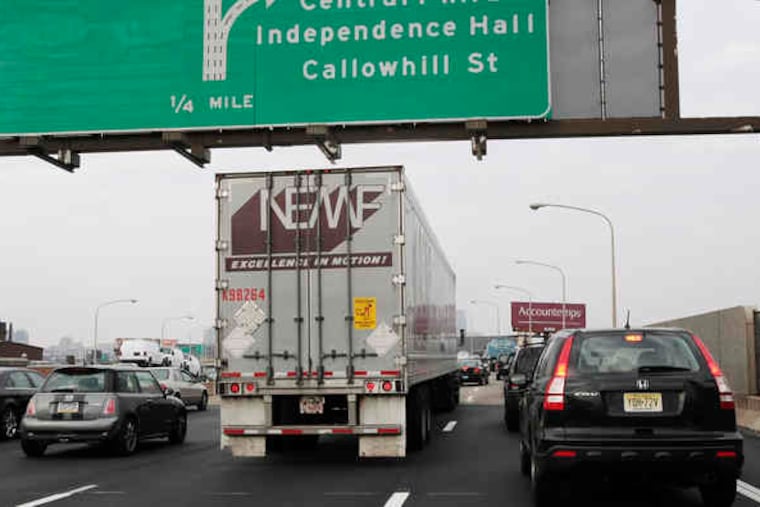PhillyDeals: Private toll roads are on their way back
In the early years of this republic, if you wanted to pull your wagon from, say, Paoli to Broad Street, you had to pay the people who owned the road.

In the early years of this republic, if you wanted to pull your wagon from, say, Paoli to Broad Street, you had to pay the people who owned the road.
The idea that most big roads are free - I-95, the Blue Route, NJ 55 to the Shore - grew up later, with the federal highway network, and President Eisenhower's Interstate Highway System.
But now the government is broke, contractors and investors are hungry, and we're moving back in time.
In 1792, Pennsylvania let the Philadelphia and Lancaster Turnpike Co. build a private road, and a series of tollbooths to pay costs and yield profits to its owners.
Privately owned toll roads, ferries and bridges grew across the United States. Railroad competition forced tolls lower, but it wasn't until World War I that the state bought Lancaster Pike, and added the road to the coast-to-coast Lincoln Highway, socialized and free to users.
Except for state turnpikes and interstate bridges, with their political jobs and contracts, road tolls in most of America disappeared.
Get ready to welcome them back to a neighborhood near you.
De-socialism
Starting Tuesday, Gov. Rendell is presiding over a special session of the Pennsylvania Legislature that's supposed to figure out where to get money to fix roads and bridges, now that his effort to rent the Pennsylvania Turnpike and the turnpike commission's attempts to charge tolls on I-80 have failed.
Waiting in the wings is a well-funded movement, with support in both parties, by building contractors, investors and their professional representatives, to reintroduce private toll roads and other creative financing through "Public-Private Partnerships."
Instead of borrowing money and paying contractors as they build, the partnerships enable private companies to raise their own road funding - from banks, investors, even federal loan programs - and pay it back, plus profits, by charging tolls on drivers who use the improved roads and bridges.
It's happening already in Virginia, Colorado, and other states that have passed the needed laws and welcomed private capital back onto the highways, along with high-tech surveillance-based tolling that can take your money quietly, while you drive. No more tollbooths.
"Nobody's against this," insists Frank M. Rapoport, a Devon resident who represents big contractors as a partner with Washington-based McKenna Long & Aldridge L.L.P. He cited data from Republican pollster Frank Luntz, who found commuters would pay more to drive, if it would cut traffic delays.
"They're going to toll I-95. There's no question about it," Rapoport told me cheerfully. "Around Philadelphia, one of the first roads that's going to be tolled is US 422. You've got the major pharmaceutical companies up there. you've got all the traffic. Put in an extra two lanes, and toll them."
What other projects lend themselves to private funding and tolls? New lanes for the Schuylkill Expressway, above or beside the current road. Philadelphia's Schuylkill bridges. Maybe the bridges run by the Delaware River Port Authority and other bistate entities.
"The bond lawyers aren't real happy," Rapoport said. "They need to recycle themselves [and learn to arrange private financing]. Like me. I'm a dating service. I match contractors with union pension funds and other investors. It's how schools, stadiums, and roads get built all over the world."
Rapoport learned the ropes of public-private finance helping the former GMH Communities Trust of Newtown Square build housing and dormitories for military bases and colleges across the U.S. GMH funded construction; now its successor companies collect the rent from sheltering soldiers and students. Roads are a logical next step, Rapoport said.
Won't drivers rebel when they realize how much it's starting to cost? "My personal idea of what would work best, would be, you toll the express lanes," Rapoport said.
Drivers who couldn't or wouldn't pay could wait in traffic. No charge.